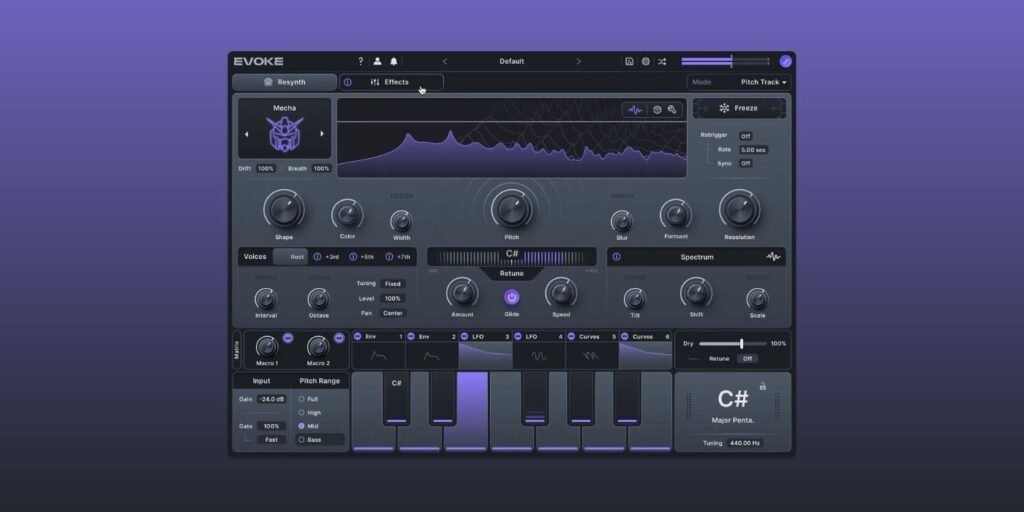Minimal Audio has released Evoke, a brand-new vocal effect plugin for macOS and Windows. It’s available now at a limited-time intro price of $79 (regularly $129).
Evoke is marketed as a “hypermodern” vocal processor, and after spending some time with it on an old pop vocal session of mine from 2020, I can see why.
Instead of working like traditional pitch correction or vocoding, Evoke uses a resynthesis engine powered by vocal modeling and spectral analysis.
The plugin doesn’t just readjust your audio. It actually rebuilds a new signal based on the vocal input, which is an approach unlike anything else I’ve used in this category. It can do anything from modulation and retuning to harmonizing and more.
One of the first things that impressed me was how easy it is to get started. You drop Evoke onto a vocal track, set the project key, and it’s ready to start rebuilding or harmonizing your vocals.
I tried it on a chorus vocal, and with just a few clicks through the presets, it transformed a basic pop lead into a harmonized stack without requiring me to duplicate takes or set up a vocoder bus. The built-in multi-voice harmonization feels tight and surprisingly natural, avoiding that “robot choir” effect.
The FX rack is another highlight. It’s modular, with eight swappable processors including multi-band compression, reverb, distortion, and frequency shifting.
I especially liked the frequency shifter. Just nudging it slightly gave my vocals a dreamy and somewhat psychedelic edge, which, when mixed with a bit of reverb, sat surprisingly well over an otherwise polished pop mix.
But things get more interesting once you start digging into modulation. Evoke borrows Minimal Audio’s familiar modulation system from Current and Rift. You can assign LFOs, sequencers, or envelope followers to virtually any parameter.
This means you can set subtle pitch movements, automate harmonies that evolve over time, or even modulate reverb size for that modern “morphing space” effect. It’s basically an experimental playground for vocal sound design, but I felt that the complexity is optional and never comes at the expense of workflow.

One of the reasons for it feeling so quick to operate is the factory library, which includes 350 presets, ranging from subtle pop enhancers to wild experimental textures.
I found quite a few presets designed for backing vocals that instantly reminded me of the wide-panned vocal stacks you hear in R&B and modern EDM crossovers. They needed little to no tweaking (mostly reverb and tone EQ) to sit in the mix.
And that’s just one part of what Evoke can do. There are also various presets for the main vocal, from retuning to pitch tracking, stacking, and more.
What I like most about Evoke is that it feels less like a corrective tool and more like a creative instrument for vocals. You drop it on a vocal and it instantly sparks new ideas, and I believe that exactly this is Evoke’s main advantage.
Evoke runs on macOS 10.11+ (including Apple Silicon) and Windows 10+, with support for AAX, AU, VST2, and VST3 formats.
Product page: Evoke ($79 intro price)
More:
Last Updated on October 1, 2025 by Tomislav Zlatic.




